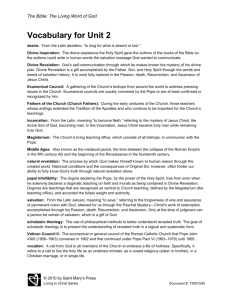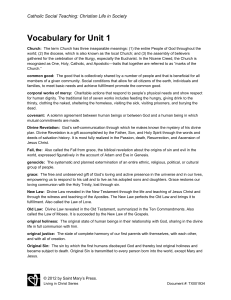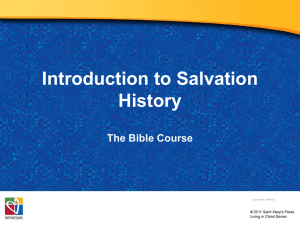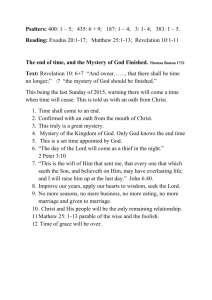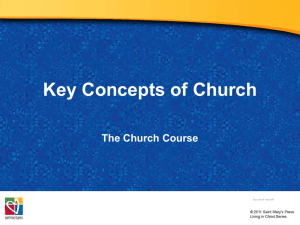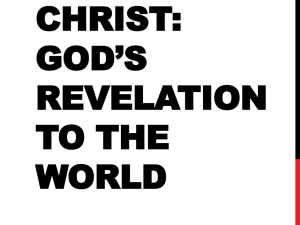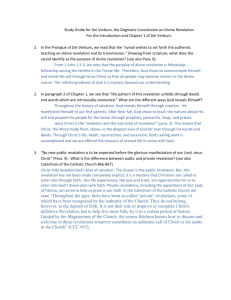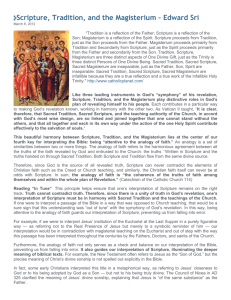Word - Saint Mary`s Press
advertisement
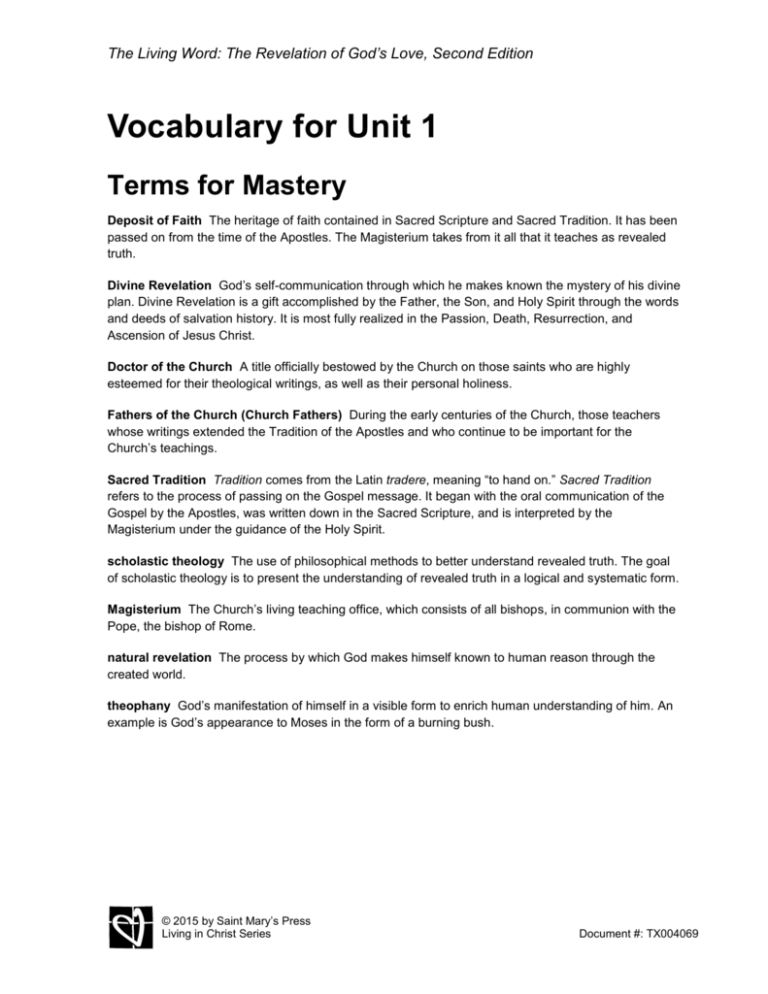
The Living Word: The Revelation of God’s Love, Second Edition Vocabulary for Unit 1 Terms for Mastery Deposit of Faith The heritage of faith contained in Sacred Scripture and Sacred Tradition. It has been passed on from the time of the Apostles. The Magisterium takes from it all that it teaches as revealed truth. Divine Revelation God’s self-communication through which he makes known the mystery of his divine plan. Divine Revelation is a gift accomplished by the Father, the Son, and Holy Spirit through the words and deeds of salvation history. It is most fully realized in the Passion, Death, Resurrection, and Ascension of Jesus Christ. Doctor of the Church A title officially bestowed by the Church on those saints who are highly esteemed for their theological writings, as well as their personal holiness. Fathers of the Church (Church Fathers) During the early centuries of the Church, those teachers whose writings extended the Tradition of the Apostles and who continue to be important for the Church’s teachings. Sacred Tradition Tradition comes from the Latin tradere, meaning “to hand on.” Sacred Tradition refers to the process of passing on the Gospel message. It began with the oral communication of the Gospel by the Apostles, was written down in the Sacred Scripture, and is interpreted by the Magisterium under the guidance of the Holy Spirit. scholastic theology The use of philosophical methods to better understand revealed truth. The goal of scholastic theology is to present the understanding of revealed truth in a logical and systematic form. Magisterium The Church’s living teaching office, which consists of all bishops, in communion with the Pope, the bishop of Rome. natural revelation The process by which God makes himself known to human reason through the created world. theophany God’s manifestation of himself in a visible form to enrich human understanding of him. An example is God’s appearance to Moses in the form of a burning bush. © 2015 by Saint Mary’s Press Living in Christ Series Document #: TX004069 Vocabulary for Unit 1 Terms Introduced for Later Mastery Apostolic Succession The uninterrupted passing on of apostolic preaching and authority from the Apostles directly to all bishops. It is accomplished through the laying on of hands when a bishop is ordained in the Sacrament of Holy Orders as instituted by Christ. The office of bishop is permanent, because at ordination a bishop is marked with an indelible, sacred character. conscience The “inner voice,” guided by human reason and Divine Law, that enables us to judge what is good and what is evil. To make good judgments, one needs to have a well-formed conscience. covenant A solemn agreement between human beings or between God and a human being in which mutual commitments are made. dogma Teachings recognized as central to Church teaching, defined by the Magisterium and considered definitive and authoritative. Ecumenical Council A gathering of the Church’s bishops from around the world to address pressing issues in the Church. Ecumenical Councils are usually convened by the Pope or are at least approved by him. Incarnation From the Latin, meaning “to become flesh,” referring to the mystery of Jesus Christ, the Divine Son of God, becoming man. In the Incarnation, Jesus Christ became truly man while remaining truly God. Original Sin From the Latin origo, meaning “beginning” or “birth.” The term has two meanings: (1) the sin of the first human beings, who disobeyed God’s command by choosing to follow their own will and thus lost their original holiness and became subject to death;, (2) the fallen state of human nature that affects every person born into the world, except Jesus and Mary. Paschal Mystery The work of salvation accomplished by Jesus Christ mainly through his Passion, Death, Resurrection, and Ascension. patriarch The father and spiritual leader of a tribe, clan, or tradition. Abraham, Isaac, and Jacob were the patriarchs of the Israelite people. prophet A person God chooses to speak his message of salvation. In the Bible, primarily a communicator of a divine message of repentance to the Chosen People, not necessarily a person who predicted the future. redemption, redemptive From the Latin redemptio, meaning “a buying back,” referring, in the Old Testament, to Yahweh’s deliverance of Israel and, in the New Testament, to Christ’s deliverance of all Christians from the forces of sin. salvation From the Latin salvare, meaning “to save,” referring to the forgiveness of sins and assurance of permanent union with God, attained for us through the Paschal Mystery—Christ’s work of redemption accomplished through his Passion, Death, Resurrection, and Ascension. Only at the time of judgment can a person be certain of salvation, which is a gift of God. © 2015 by Saint Mary’s Press Living in Christ Series Handout Page | 2 Document #: TX004069 Vocabulary for Unit 1 salvation history The pattern of specific events in human history in which God clearly reveals his presence and saving actions. Salvation was accomplished once and for all through Jesus Christ, a truth foreshadowed and revealed throughout the Old Testament. Trinity From the Latin trinus, meaning “threefold,” referring to the central mystery of the Christian faith that God exists as a communion of three distinct and interrelated Divine Persons: Father, Son, and Holy Spirit. The doctrine of the Trinity is a mystery that is inaccessible to human reason alone and is known through Divine Revelation only. Vatican Council II The Ecumenical or general Council of the Roman Catholic Church that Pope John XXIII (1958–1963) convened in 1962 and that continued under Pope Paul VI (1963–1978) until 1965. vocation A call from God to all members of the Church to embrace a life of holiness. Specifically, it refers to a call to live the holy life as an ordained minister, as a vowed religious (sister or brother), or in a Christian marriage. Single life that involves a personal consecration or commitment to a permanent, celibate gift of self to God and one's neighbor is also a vocational state. wisdom literature The Old Testament books of Proverbs, Job, Ecclesiastes, Sirach, and the Wisdom of Solomon. Terms Previously Mastered or for General Knowledge continency, continence The ability to restrain oneself from sin, especially sexual sin. Abstinence of all sexual activity. contingency A state in which something relies or depends on something else. foreshadow To represent or prefigure a person before his or her life or an event before it occurs. Middle Ages Also known as the medieval period, the time between the collapse of the Roman Empire in the late fifth century AD and the beginning of the Renaissance in the fourteenth century. © 2015 by Saint Mary’s Press Living in Christ Series Handout Page | 3 Document #: TX004069
